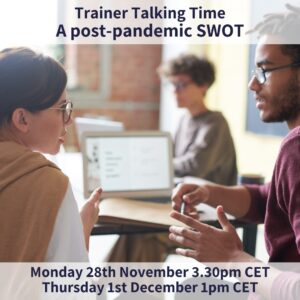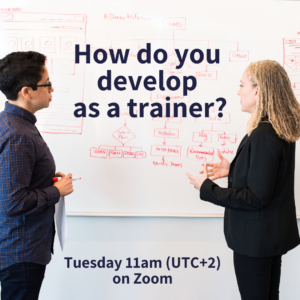Thanks to everyone who came along to this month’s Trainer Talking Time. The notes are a bit of a stream of consciousness, but I’ve tried to separate them out a little into different themes.
Using different platforms
Not just moodle or your LMS of choice but, e.g. using Telegram or Slack for chat and a potential backchannel during observations.
Offering alternative means of communication between trainers and CPs – but without overwhelming them, e.g. use email to subit work, using Slack to ask questions.
Different channels can facilitate types of communication (e.g. using audio more than text). Who’s interacting with what they post? Will everyone be able to interact with the content (e.g. a deaf CP and audio input).
Facilitate regular communication about their preferred means of communication and adapt as necessary (i.e. they might say aduio notes are best at the start but as the course progresses, realise that text is more feasible).
What about the time it takes for CPs and trainers to create and consume content? Written tends to be quicker to engage with. From a centre’s point of view – do they offer fixed rates for marking whatever the format?
In terms of submitting work – offering options/choice and also whether people decide to share their thoughts with others or if it’s private reflections.
A key consideration: What’s the most practical format for each task?
Supporting course participants
Moving into inclusivity and the application process. “Do you have any SEN?” could be changed to something more ‘welcoming’, e.g. “What sort of learning differences do you have? And how can we help?” Helps to fight some of the stigma around SpLDs. This means you can get input from the people who are affected and find a way to make the course work better for them.
Make more of the application / interview process to really get to know the person and their needs, e.g. time management, managing commitments whilst taking a course (family, work). Building rapport, making it clear it’s not a gatekeeping issue, how we phrase our questions both in the form and when we talk in-person, where it comes during the process. One-sentence scenarios to reflect on how they might respond in a situation. Can you give people an experience of what to expect before starting?
Personalisation
MENTORING! Teachers really get to focus on what they want and need in a personalised way. And training other people to take on that role. Moving into a training role also helps you to become a more effective teacher.
A move away from designated tasks in teacher observation (in-house) – Jim and co. offer observation and reflection menus…some require more work on the trainer’s part and the teacher e.g. the self-observation requires more work by the teacher. Jim said folks are welcome to contact him to get copies of the menus 😁
What type of ‘learner training’ is involved in offering choice? You can also push people out of their comfort zones by taking away the most popular choice the next time round. Gives people a sense of ownership and responsibility. The amount of training may also depend on experience.
Templates or variety?
Using criteria for observation / are systems and structures in place too rigid for some CPs? e.g. for a lesson plan How could you include all these different elements in a format that works for you? Bottom line is that certain things need to be done / requirements met and as a trainer, if you get six LPs and know what to look for in each section, it’s much easier than get six slightly different documents.
Are there optional parts on a form? So there could be minimum requirements and then extras that people have the choice of adding in. Have a checklist for lesson plans for both the tutor and CP to check they’ve covered the basic requirements.
Include a section on lesson plans for observations: How inclusive is your classroom? A very open question, which can be interpreted in different ways and shows how different people interpret it. This increases course participants’ awareness of inclusivity and differentiation.
Time
Flexibility in deadlines – planning the course with built-in leeway, e.g. a four-week block (three weeks’ input plus one week to catch up or use the time to get ahead with the next block’s work). Centres impose deadlines to get people through the course (e.g. anything submitted after the course date for Trinity Cert is late and requires extra payment). Being an adult in a professional environment, deadlines are a thing! Why might someone struggle with deadlines? Are the deadlines unrealistic? Levels of motivation might be high at the start but perhaps not aware of the actual workload? Is there a particular event which caused them to get behind? Explaining why the deadlines are there can help people see the rationale for them.
Dealing with ‘difficult’ CPs – tends to be difficulties with the format of the course. Some people require more support than others. How do we include without ‘limiting’ what we offer to other people? If person A requires extra support, does that mean person B misses out on trainer time which could help to push them in other ways? (equality and equity) With pre-service courses, we want to get people to the minimum required – and course providers assume everyone will get to that point through interview process.
The way we approach these conversations, rather than asking What do you need to do in order to complete the course? to How can we be inclusive at this point?
With adults, should they not be more responsible to get what they need from the course?





